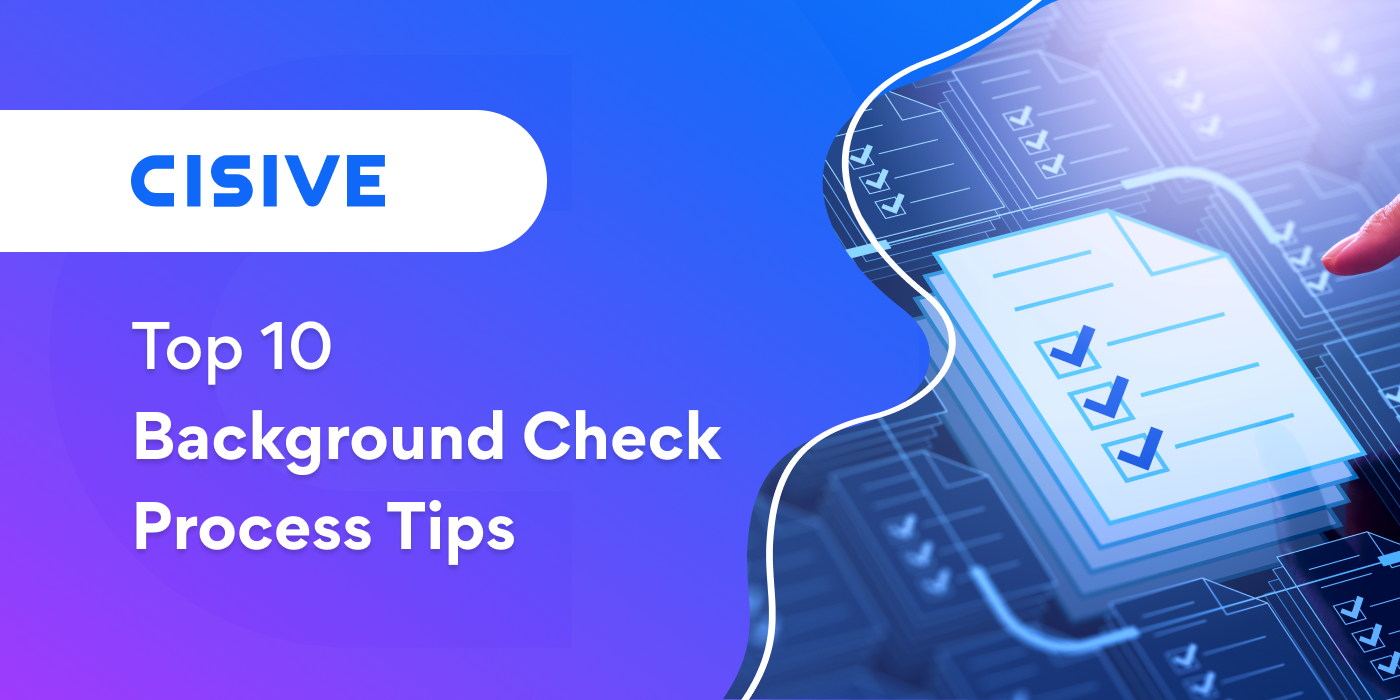

Finding the right candidate for a new job opening is no easy feat. Between analyzing résumés and...

Employees are the heart of your company. Their salaries and benefits are also most companies’ largest expense, so it’s critical that you hire excellent talent that can justify the cost.
Background checks are a key step in avoiding bad hires and sunk costs. A well-defined background check process helps ensure your screenings are accurate, efficient, and compliant. In this article, our experts highlight numerous things to consider when creating or optimizing your employment screening process.
Key TakeawaysHere are the key things you need to know about the background check process:
|
The background check process refers to the steps an employer takes to examine records of job applicants, usually near the end of the hiring process. It usually covers employment records, court records, financial records, and more. Conducting background checks helps employers reduce the risk of making a bad hire.
This screening process must comply with any federal, state, and local laws designed to prevent employment discrimination and violation of privacy. It can be done manually, by contacting each entity on your own, or through a background check system.
Once the employment screening process is complete, you’ll have a clear report on the applicant’s background and any red flags. From there, you can decide whether to hire them.
Depending on your needs as an employer, the background checks you conduct could cover many different parts of a candidate’s life. You may be interested in anything from the candidate’s credit history to their driving records.
All that information is contained in separate databases spread around the country and maybe even around the world if you’re hiring international candidates:
If you conducted your background checks manually, you’d need to contact every agency that may have the information you need. That’s very slow and costly, so it's recommended that you use background check tools provided by experts like Cisive, who can provide a one-stop-shop experience.
The depth and scope of background checks vary by role, industry, and location. Generally, the most popular types of background checks include verification of employment history, educational history, criminal records, identity, and driving records.
Positions in certain industries, such as finance, may also involve looking into candidates’ credit history. Drug screenings are also a common part of the process.
In most situations, employers are not legally required to conduct background checks. However, skipping background checks exposes the company to high levels of risk.
Employers are obligated to provide a safe workplace. They’re also obliged to make sure their company, and therefore their employees, don’t pose a risk to customers or the public.
Failing to fulfill these obligations can expose the company to damaging and costly lawsuits for negligent hiring. Because of this risk, every wise employer invests in pre-employment screening.

Depending on your industry and the roles you’re hiring for, you can conduct a variety of employment screenings. Some industries, like healthcare, may perform all of these and more.
Here are some examples:

An efficient background check process helps your business move forward with confidence by covering many different bases.
If you don’t perform a background check, you could hire someone who could be dangerous to your other employees or the public. If your employee lied about their qualifications and goes on to harm a customer, you could face lawsuits and fines.
For example, let’s say a bank hires someone with a history of financial misconduct, and that person goes on to defraud a customer. The bank could be liable for negligent hiring and other legal violations.
Bad hires can negatively affect your company’s reputation both internally and externally. Internally, you can easily lose the confidence of existing employees if you hire new people without vetting them for qualifications and character.
Externally, your company could suffer anything from poor online reviews to much worse if members of the public have bad experiences with your employees.
Employees have to spend a lot of time around each other. They depend on each other to get their jobs done. If you hire an unqualified or problematic person, the jobs of your other employees become much more difficult.
When you have a thorough background check process, you increase the chances that the people you hire can contribute effectively. This gives your employees confidence that they work at a company that knows what it’s doing.
High-quality employees create high-quality experiences for customers and clients. These experiences build customer loyalty and repeat business.
A solid background check process helps you spot red flags in candidate profiles. You can avoid hiring people whose backgrounds indicate they may not always put customers first.
Professionals in industries like healthcare, finance, and technology know their worth. When they switch jobs, they know how they should be treated throughout the interview and hiring process.
If something “feels off” to them, they’re likely to take themselves out of consideration. Therefore, your background check process needs to be smooth. It needs to make you look organized and efficient.
Here are 10 tips for improving your background check process. In addition, be sure to read our comprehensive guide to background checks.
Does your current process require HR to manually contact agencies to get background information? How accurate are your results? Do your checks take more than a few hours to do?
Hold meetings with HR and hiring teams to honestly discuss issues with your current process. Then, develop a plan to address those problems.
Every industry uses background screenings differently. In a highly regulated industry like healthcare, employees may have people’s lives in their hands. These businesses tend to conduct more in-depth background checks than those in other industries.
For finance, evidence of fraud or red flags on their credit report could hold more weight. For other industries, driving records are critical. Be aware of what your peer companies do, because candidates will expect similar processes to your competitors.
The background check process must fit into a broader overall recruiting and hiring strategy. Remember, background checks come toward the end of the hiring process. Try to minimize the risk of poor candidates getting to this step in the first place.
Develop strategies to recruit great people and vet their qualifications during phone and in-person interviews. Read our article on effective recruiting and hiring strategies for ideas.
Hiring is full of legal and regulatory requirements. You must comply with the Fair Credit Reporting Act (FCRA), privacy laws, and digital compliance. State and local laws directly affect how and when you can conduct certain types of background checks.
The sheer breadth of these regulations is one big reason most employers rely on a background check service like Cisive to handle compliance.
Reduce risk and liability by ensuring you have a written background check policy. The policy keeps you consistent, compliant, and accurate. Revisit the policy with leadership periodically to make any necessary updates.
Job candidates want to know where they are in the hiring process. If a background check reveals an issue, don’t “ghost” the candidate. Instead, have a plan for communicating with the candidate and give them an opportunity to explain themselves.
You might not ultimately hire the person, but you’ll have given the candidate a positive experience through effective communication.
Any kind of discrimination, even unintentional, can be the basis for a lawsuit or fine. This is why there are laws like the Americans with Disabilities Act (ADA), the Age Discrimination in Employment Act (ADEA), and more.
Fair hiring practices, like using inclusive language in job descriptions and implementing steps to reduce bias, can help you avoid any legal entanglements.
*For U.S. Employers, speak to your legal counsel regarding fair hiring practices under the new administration, as policies are rapidly changing (Jan 2025).
It’s important to be very careful when you are running checks. Make sure that everything is spelled correctly and double-check city and state names for educational institutions. Contacting the wrong agency or using the wrong information can delay your background check and make it more difficult to ensure accuracy overall.
Pre-employment background checks are excellent, but they’re a one-time thing. To ensure the ongoing safety of your workplace, consider doing ongoing monitoring of your existing employees.
Continuous monitoring helps you become aware of criminal convictions, driving and traffic offenses, and other potential problems much sooner than you would otherwise.
Manually conducting background checks is simply not feasible and not advisable for companies that hire regularly. There are far too many laws to comply with, courts to contact, schools to contact, and so on.
Automating the process with background check software from Cisive helps you do checks fast and with 99.9994% accuracy so you can hire quickly and confidently.
Services such as Cisive use technology to quickly access data from thousands of sources and present results in an easily digestible format. Technology can relieve your staff of the burden of manually gathering data, freeing them up to do more valuable job duties.
The results from Cisive are far more accurate than what an individual, facing limited time and resources, would be able to deliver. And they get to you faster, saving you time and money.
Creating or improving your background check process may initially feel daunting, but it isn’t as challenging as it may seem. Tools from Cisive can help you at every step of the process. Our expert team is always here to provide guidance. Reach out today to learn how we can help you make informed hiring decisions by improving your pre-employment screening process.
Author: Jenni Gallaway
Bio: Content Marketing Manager at Cisive. 8 years of experience in the background screening industry.
Let's Connect on LinkedIn
Finding the right candidate for a new job opening is no easy feat. Between analyzing résumés and...

Every medical assistant plays a central role in handling confidential data and interacting with...

Safety and compliance are two ongoing core concerns of any academic health center. Students and...